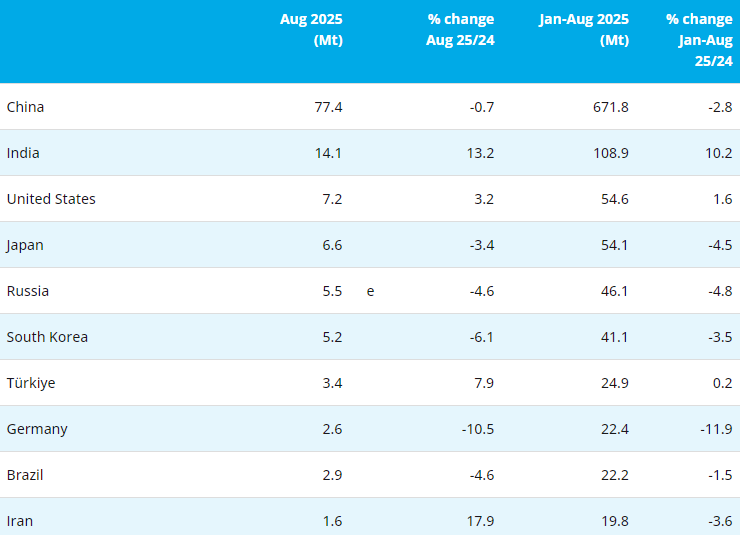[ferro-alloys.com]
China has a seemingly endless hunger for iron ore but the country's relationship with one of its primary providers, Australia, has been tenuous following the political fallout of the Covid-19 pandemic. We take a look at how China has been investing in other nations to meet this hunger and how it may affect the wider iron ore market.
Welcoming the world into the year 2021 was the news that China would accelerate its work on iron ore projects in Africa and Australia, a reminder of the country’s intention to bolster its own supply for steelmaking as well as its strength as an influencer on the global market.
Australia has long been China’s go-to for iron ore, with Australia’s vast iron ore production and the proximity of the two countries making for a productive relationship.
Australia is the largest source of feed for China’s steel mills, with around 60% of China’s iron ore imports originating from Australian mines. But ongoing tension between the countries have alarmed the iron ore and steel industry, with speculation over the future of the China-Australia iron ore trade.
Relations between Canberra and Beijing have been fraught since the initial onset of the Covid-19 pandemic in early 2020, with Australia’s policymakers calling for an independent investigation into the origins of the virus and China’s initial handling of the outbreak in Wuhan.
The response from China has involved effectively shutting Australian producers out of the Chinese market in certain industries. From slapping duties of 80.5% on Australian barley, suspending imports from beef suppliers, to banning timber imports from Australian states, China has constantly ramped up the pressure on the Australian Government over the past year.
Australia remains vital for China’s iron supply
A suggested response to China’s trade restrictions has been to stop sending Australian iron to China. It’s really the one export Australia has that China needs – for all its economic and political strength, the Chinese state will not easily replace 60% of its iron ore supply.
China’s other major supplier is Brazil, which has been struggling with Covid-19 infections in its mining sector, as well as high-profile mining accidents that have undermined confidence in the industry in recent years. Theoretically, Australia could deal a severe blow to China by withholding the iron ore it craves, and perhaps accelerate a resolution to the tensions.
But things are never simple. Australia, like many other countries, is still dealing with the economic effect of the pandemic. However far the war of words extends from Prime Minister Scott Morrison, Australia is unlikely to cut off a market worth tens of billions of dollars at a time when economic recoveries are only just beginning.
Despite the tensions, and despite China’s desire to move away from its reliance on Australia, the iron ore trade between the two countries is still booming.
“In 2020, Australia remained the largest supplier of iron ore with 732Mt, up from 691Mt in 2019, mainly due to higher quality and favourable transportation cost,” says GlobalData mining analyst David Kurtz. “China imported 313.8Mt of iron ore from Brazil, South Africa, and India put together, which is less than half of what China imports from Australia.”
Australia may be the dominant supplier now, and will continue to be necessary for China’s supply in the near future, but that might not always be the case. Even those relatively paltry import numbers from countries besides Australia show a China increasingly serious about moving beyond Australian iron; India may only have exported 44.8Mt of iron ore to China in 2020, but that’s an increase of almost 90% over the 2019 figure.
China’s eyes for iron turn to Africa
80% of China’s iron ore is imported from overseas, but it’s not clear how much of that iron ore is produced at mines that China owns interests in. China’s domestic supply suffers low grades compared to the major iron producing nations like Australia and Brazil, meaning the state has had to turn its attention overseas for iron.
Kurtz says that he would anticipate a challenge for China in finding markets other than Australia, and says this would be “surreal” within the next five years.
“However, China is aiming to extend its partnership in the exploration or development of projects across other countries, mainly in Guinea,” he explains. “Simandou is one such major project, which is expected to have 100Mt of iron ore production capacity. The project is expected to start its first production in 2025/26.”
Simandou itself, a 110km range of hills in the West African nation, could be a significant boon to China’s iron ore ambitions. Advocates of the site have labelled it a “Pilbara killer”, and the site is said to boast the world’s largest untapped iron ore reserves.
Guinea is host to a few other significant projects, two of those being Kalia and Zogota, which have a combined production capacity of over 20Mt. Both are expected to be operational by 2023. Perhaps the starkest sign of Guinea’s iron ore potential is China’s interest in it – a China-backed consortium won a $14bn deal to develop part of the Simandou project late last year.
China has been steadily growing its relations with African nations for several years; China has been South Africa’s largest trading partner for over a decade now and Chinese Foreign Minister Wang Yi recently went on a tour of five African nations, visiting Nigeria, the Democratic Republic of Congo, Botswana, Tanzania, and Seychelles.
While Australia can still expect to be China’s primary provider of iron ore for the foreseeable future, the signs are pointing to an expanded role for African suppliers.
- [Editor:Catherine Ren]



 Save
Save Print
Print Daily News
Daily News Research
Research Magazine
Magazine Company Database
Company Database Customized Database
Customized Database Conferences
Conferences Advertisement
Advertisement Trade
Trade
















Tell Us What You Think